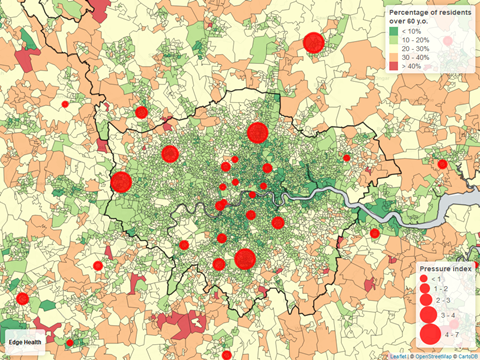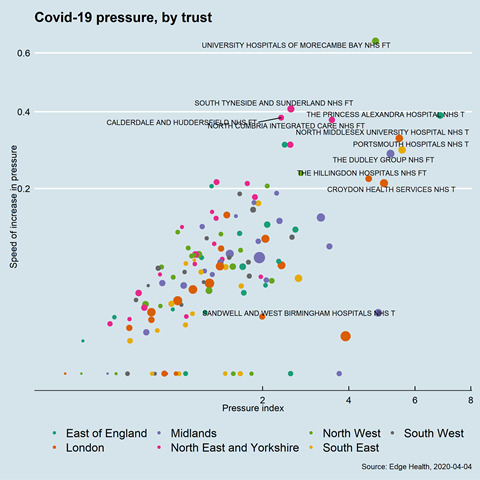New analysis from Edge Health shows that district general hospitals around the centre of London have been the hardest hit by the covid-19 surge, says George Batchelor
Peak covid-19 may be upon us with the number of new daily cases likely to peak this week. Hospital beds occupied by covid-19 patients are expected to peak next week, and critical care beds the week after. Hopefully, newly reported covid-19 deaths will start to fall by the end of the month even if the demands on hospitals do not tail off as quickly as hoped.
Fortunately, the impact of this surge is now looking like it will be less than initially expected. Social distancing and isolating measures before the lockdown have had a dramatic effect on the spread of the disease.
Those hit hardest are the district general hospitals around the centre of London where high covid-19 cases and older populations have not mixed well with lower pre-covid-19 critical care bed capacities.

In March, Northwick Park declared a major incident due to a lack of critical care beds and more recently when Watford General declared a major incident due to its oxygen supply. The pressure may continue for a few more weeks until the tide turns.
We have created an index that attempts to identify hospitals that are facing the most pressure. It does this by looking at reported deaths after controlling for demographics and pre-covid-19 capacity.
The Princess Alexandra Hospital Trust, for example, reported 53 covid-19 deaths in total on 5th April. Compared to other trusts, this is relatively high given it only had 10 pre-covid-19 critical care beds – even after controlling for factors, such as age – so it scores 6.9 on the index and ranks highest at this point. Facing this amount of pressure does not mean that it is unable to meet this demand safely, but it will certainly have been harder than Cambridge University Hospitals Foundation Trust who had over 60 critical care beds and seen 14 deaths to date.
| Trust | Region | As of 5th April | ||
|---|---|---|---|---|
| Pressure index | Rate of change | Reported deaths | ||
| The Princess Alexandra Hospital NHS Trust | East of England | 6.9 | 9% | 53 |
| North Middlesex University Hospital NHS Trust | London | 6.3 | 30% | 78 |
| Sandwell And West Birmingham Hospitals NHS Trust | Midlands | 6.1 | 17% | 95 |
| Croydon Health Services NHS Trust | London | 5.9 | 38% | 102 |
| Portsmouth Hospitals NHS Trust | South East | 5.8 | 19% | 73 |
| The Dudley Group NHS Foundation Trust | Midlands | 5.2 | 7% | 80 |
| University Hospitals of Morecambe Bay NHS Foundation Trust | North West | 5.0 | 35% | 62 |
| The Hillingdon Hospitals NHS Foundation Trust | London | 4.6 | 9% | 48 |
| London North West University Healthcare NHS Trust | London | 3.9 | 0% | 160 |
| The Royal Wolverhampton NHS Trust | Midlands | 3.8 | 19% | 106 |
Source: Edge Health analysis
It is also helpful to see how the index changes over time – a rapid increase potentially indicating a local surge that may come as a shock. Combining this with the index generates the following chart. Trusts in the upper right are likely more vulnerable than those in the lower left as they have seen a recent and significant increase in pressure.

Croydon Health Services Trust is in the top right as it saw a jump in reported deaths from 21 to 82 in just under 10 days to 2nd April (as records are updated, this may increase further). With only 14 pre-covid-19 critical care beds, this 290 per cent increase is substantial and likely to have placed a significant amount of pressure on the trust. A lot of this pressure will have been felt over the last couple of weeks and may now be subsiding.
Some caution should be taken in interpreting these results. Some trusts may record covid-19 deaths even when this was not the primary reason for death (for example Eddie Large died with covid-19 but died of heart failure). It is also hard to say at present how well trusts prepared for covid-19 and are therefore able to meet the increase in demand.
The next three weeks will remain very challenging as peak covid-19 demand hits and sits with trusts. Once this subsides and as government policy changes to focus on livelihoods, the NHS will quite quickly need to restore cancelled services to avoid longer-term consequences from cancelled activity. In essence, this may need to be every bit as radical as the NHS’ herculean preparations for covid-19.
Topics
- Acute care
- CAMBRIDGE UNIVERSITY HOSPITALS NHS FOUNDATION TRUST
- Coronavirus
- Croydon Health Services NHS TRUST
- East Midlands
- East of England
- London
- London North West University Healthcare NHS Trust
- NORTH MIDDLESEX UNIVERSITY HOSPITAL NHS TRUST
- PORTSMOUTH HOSPITALS UNIVERSITY NHS TRUST
- SANDWELL AND WEST BIRMINGHAM HOSPITALS NHS TRUST
- South
- THE DUDLEY GROUP NHS FOUNDATION TRUST
- THE HILLINGDON HOSPITALS NHS FOUNDATION TRUST
- THE PRINCESS ALEXANDRA HOSPITAL NHS TRUST
- The Royal Wolverhampton NHS Trust
- UNIVERSITY HOSPITALS OF MORECAMBE BAY NHS TRUST
- West Midlands






























9 Readers' comments